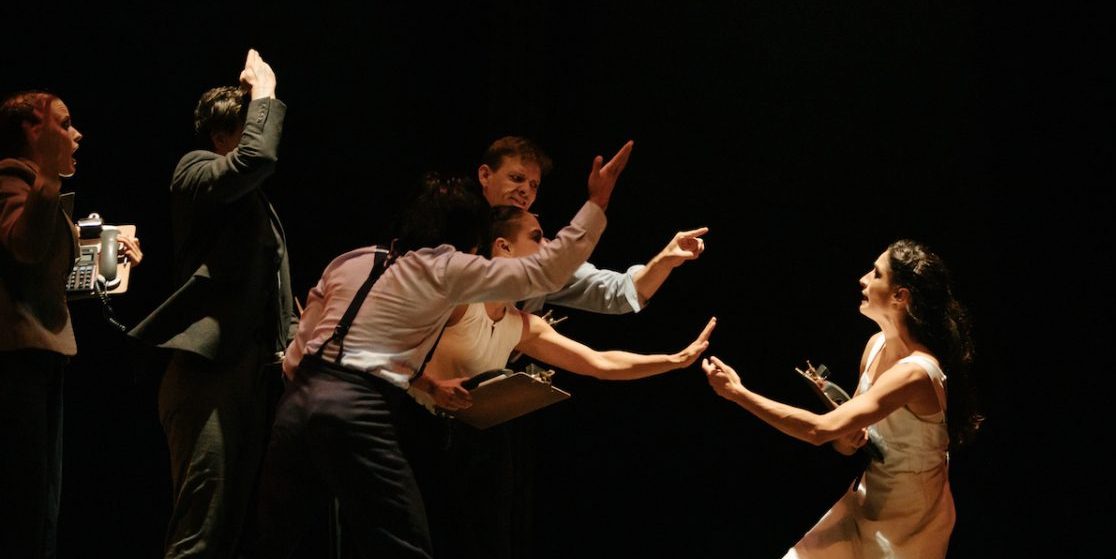Gecko’s show ‘The Wedding’ was a great success at the Barbican back in 2019 and now returns for a limited run as part of the London Mime Festival, though mime is only one aspect of the art forms on display by the nine performers, directed by Amit Lahav, who also devised the show. In fact many languages are spoken at the same time, and there is as much choreographed expressive dance as there is strict mime. This is an evening that has great visual and sensual appeal as well as offering a confronting message with many questions attached.
There is no specific narrative but rather a series of episodes which seek to probe the relationship between the individual and the state, in a way typical of this company’s desire to use physical theatre to address big themes of social relevance. The beginning of the action performers emerge from a chute landing in a pile of teddy bears before being clad in a traditional wedding dress and entering various formal settings that suggest office environments. Is the dress armour or a prison? Is our contract with society a source or protection or of limitation that obscures freedom and prevents growth? The red briefcases wielded by the office workers very much suggest the latter.
A social hierarchy is established with a wealthy elite framed in a continual feast at the back of the stage, the harassed, warring office workers in the middle and in the front, a group of migrants emerge gradually from suitcase before themselves being absorbed into the social rituals of society. Domestic and work settings are neatly contrasted. The migrant group is especially engaging and emotive in their gestural language and their journey embracing both rejection and assimilation is perhaps the most interesting and fully finished of the production’s various aspects. The evening gathers to a climax as the two lower groups band together to stage a revolution. The choreography becomes more anguished and violent, the rhythms and intensity of the soundtrack build into a unison chant, and the wealthy elite are dethroned and displaced with dramatic power. This is an assertive and hopeful ending with a sense of community triumphing over mere contract.
The production is perhaps a little long and would benefit from some tightening and pruning of the middle sections; but there is no denying its power or its popularity in a Barbican theatre packed with young people very receptive to its message of liberation. Alongside the mimetic and dance skills of the performers, we should also note the various contributions of the creative team that are central to the success of the whole. Designer Rhys Jarman’s set both allows for structure and space: cupboards, desks and constricted rooms rise and fall to give way to a full open stage to accommodate the action – the contrast between confinement and freedom is visually presented with great simplicity. Composer Dave Price has assembled an intricately layered sound world which involves instrumental music, extracts from opera, the interweaving of multiple spoken languages, and singing by the cast. Lighting designer Joe Hornsby achieves impressive effects both across the whole stage but also through lampshades and single bulbs that single out moments and characters economically and effectively, helping the narrative flow.
All in all this is a performance that resonated powerfully with its audience, and left us all with many emotional impressions and social reflections to ponder and unravel in days to come.

